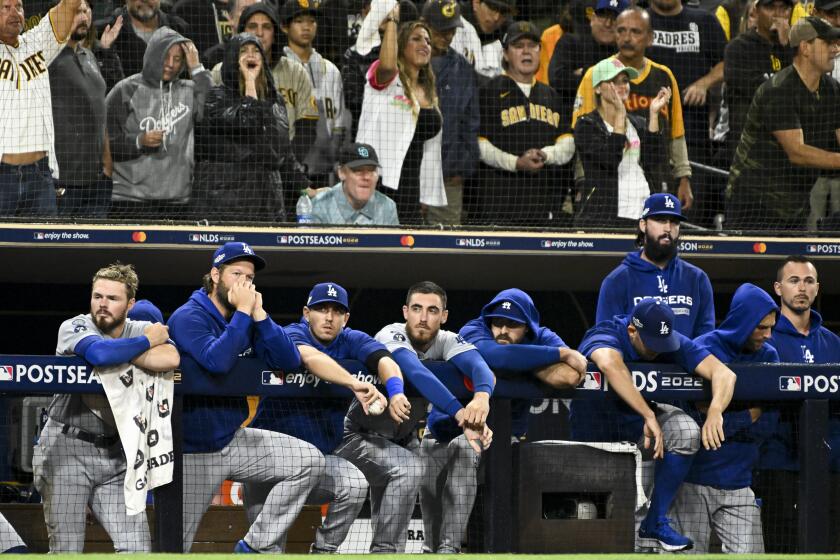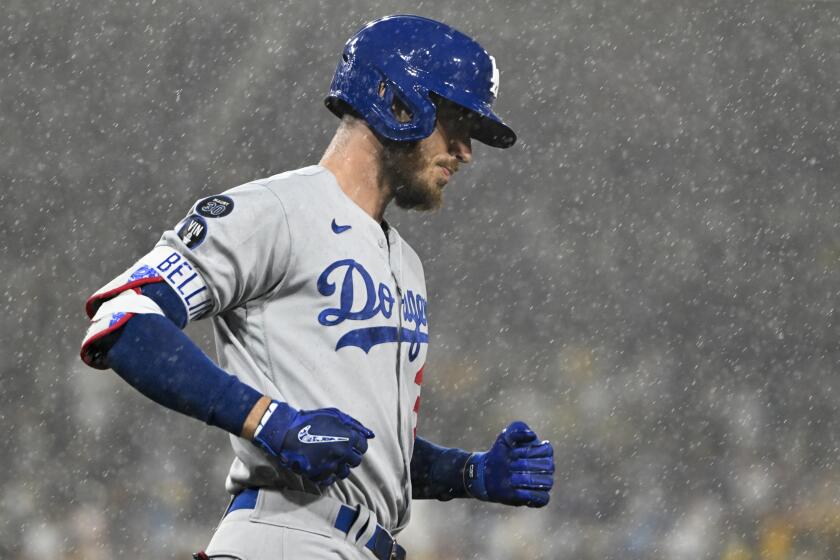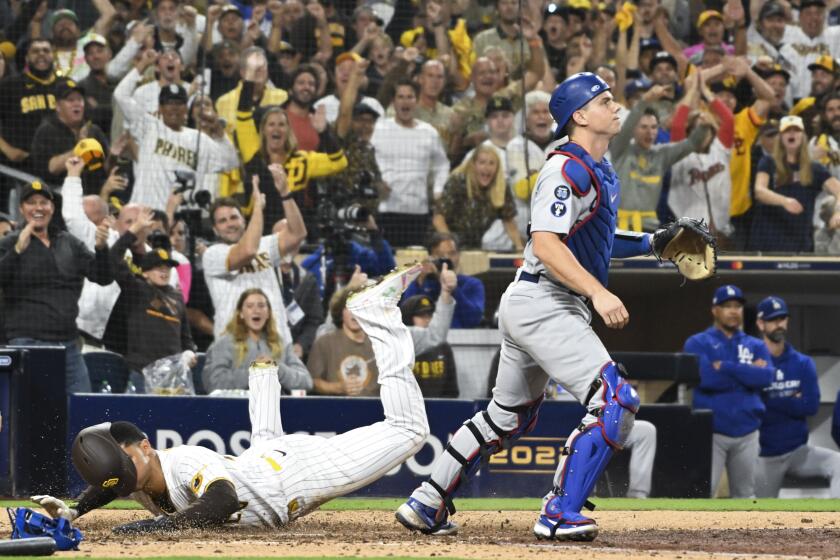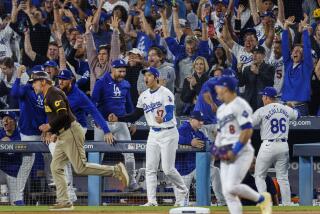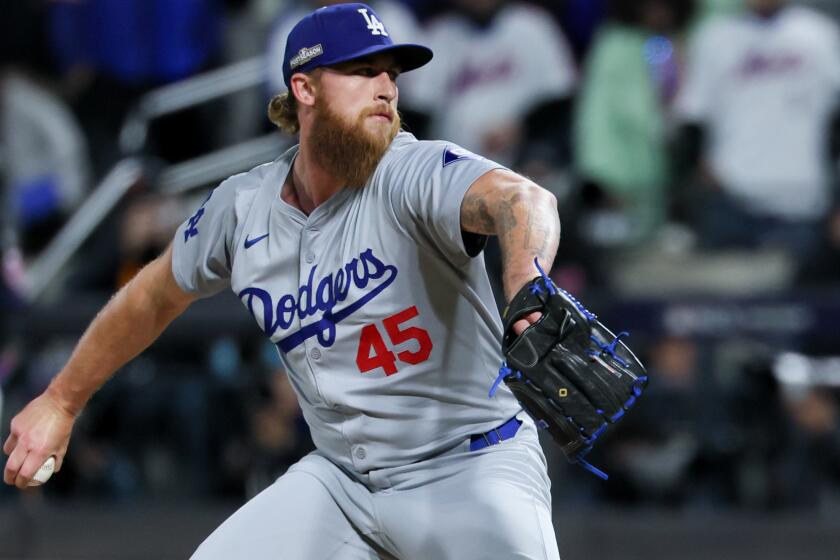Column: Blame Andrew Friedman’s roster construction, pitcher strategy for Dodgers collapse
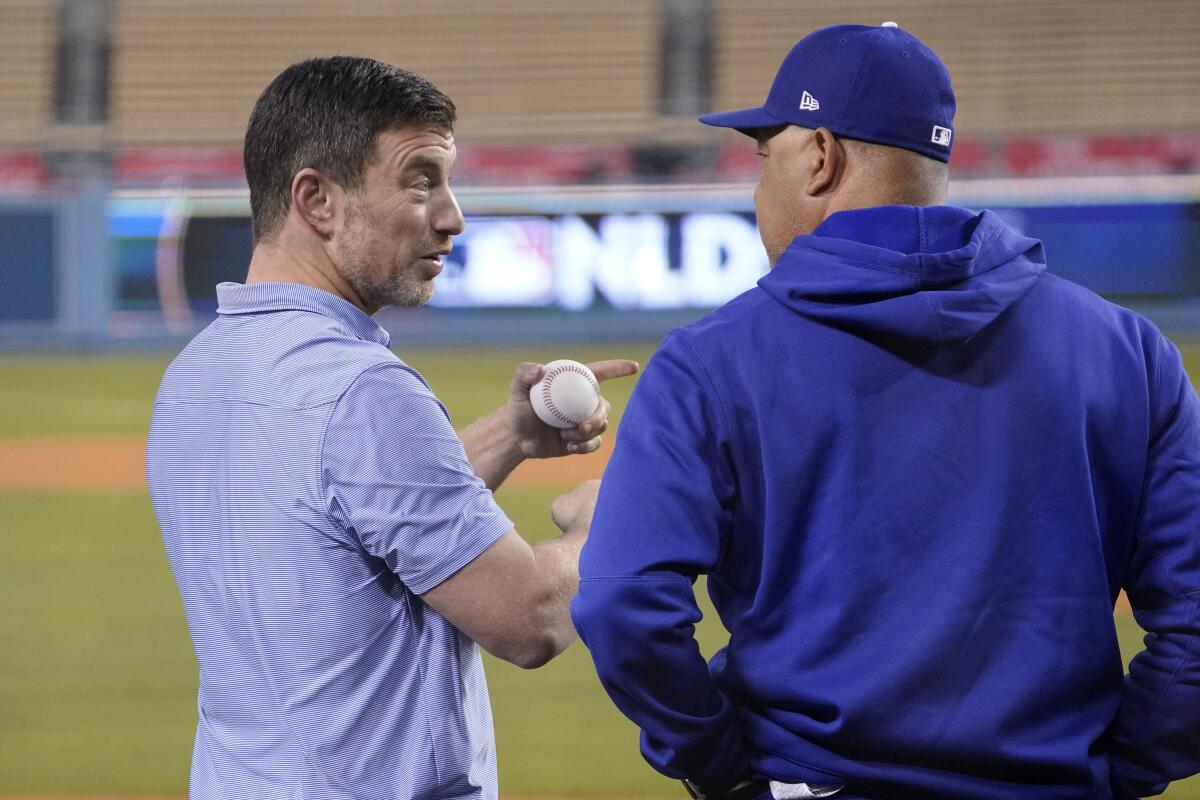
SAN DIEGO — What the Dodgers are doing with their pitching isn’t working.
No other conclusion can be reached after what transpired Saturday night when their bullpen imploded in a horrific five-run seventh inning for the San Diego Padres that erased their three-run lead and ended their 111-win season.
This can’t be considered a small sample size anymore, the Dodgers having completed eight seasons with Andrew Friedman as their president of baseball operations.
The Dodgers have reached the postseason in each of those years but have claimed just one World Series, their solitary championship during that period won in a pandemic-shortened season unlike any before or after it.
They can’t continue scripting pitching matchups for entire games.
Barely a week after setting a franchise record with 111 regular-season victories, the Dodgers see their season end in an NLDS loss to the Padres.
They can’t remove a starter when he’s pitching well just because they decided to do so beforehand.
They can’t place their manager in a position in which he has to make pitching change after pitching change.
Essentially, they can’t do what they did in their 5-3 defeat to the Padres in Game 4 of their National League Division Series at Petco Park.
Manager Dave Roberts had a major role in the come-from-ahead defeat, but more later on botched execution of the team’s iffy plans.
Any review of the Dodgers’ failure starts with the organization’s overarching philosophy implemented by Friedman that devalues starting pitching and calls for the use of an assembly line of relievers.
This is an industry-wide trend, and it works — to a degree.
The Dodgers have taken this concept to an extreme, as their management apparatus has demonstrated an inclination to stick with their pregame script rather than allow a starter who is performing well to pitch an extra inning or two.
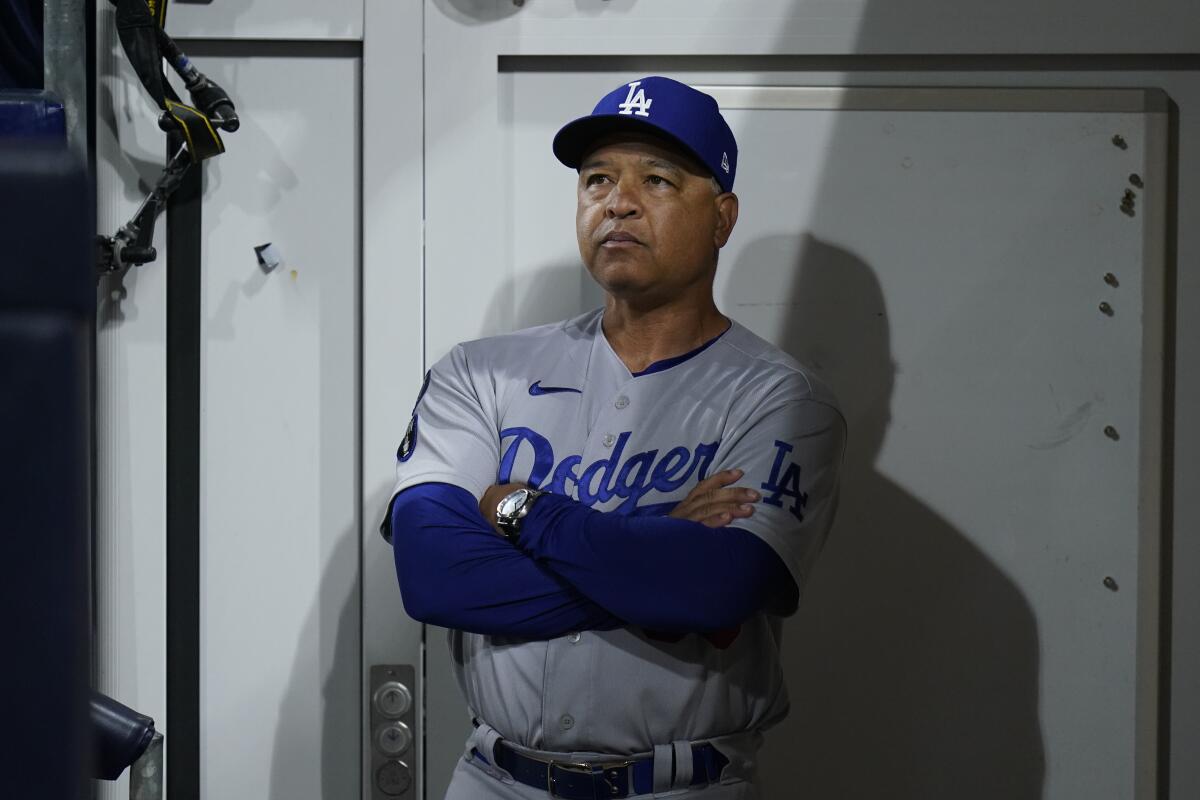
That’s what happened Saturday when Roberts removed Tyler Anderson after five scoreless innings with his pitch count at 86.
That’s also what happened three days earlier during a Game 2 loss when Clayton Kershaw was taken out after five innings even though he’d retired the last nine hitters he’d faced.
Asked if he gave any thought to allowing Anderson to return for the sixth inning, Roberts replied, “There was some thought, but where he was at with his pitch count, who was coming up, I just felt we had enough arms to get through that.”
In reality, decisions on how long to stick with starters are made before games, with Roberts consulting with the front office on the number of batters they should face.
Anderson was cruising, but the brain trust had probably decided it didn’t want Anderson pitching to Juan Soto and Manny Machado for a third time.
By limiting the responsibilities of his starting pitchers, Friedman has effectively called on his relievers to cover more innings. But if every pitching change Roberts makes is an opportunity to create favorable matchups, it’s also a chance for something to go wrong. Every call to the bullpen could be a landmine.
A Dodgers lead in Game 4 of the National League Division Series vanished amid poor execution and puzzling decision-making in a 5-3 loss to the Padres.
This is the inherent danger of the scheme.
Most relievers are failed starters. For many, success is as much about opposing hitters’ unfamiliarity with them as their stuff.
Roberts navigated the first three games of this series without serious blunders. But Julio Urías and Kershaw pitched only five innings apiece during their starts. Game 3 opener Tony Gonsolin registered just four outs. Roberts was asked to make choice after choice. He was bound to make some bad ones.
Which is what happened, Game 4 featuring a series of mistakes by Roberts and the coaching staff.
Chris Martin gave the Dodgers a scare in the sixth, giving up an infield hit to Jake Cronenworth that advanced Brandon Drury to second base. Martin escaped the jam by striking out Will Myers.
Disaster struck in the next inning.
With the Dodgers ahead by three runs, Roberts placed the game in the hands of Tommy Kahnle, who pitched all of 12 2/3 innings during the regular season.
Kahnle walked Jurickson Profar, who reached third on a single by Trent Grisham. Catcher Austin Nola drove in Profar with a single.
Evan Phillips had been used in these kinds of high-leverage situations, but Roberts suddenly decided he wanted him for the ninth inning after declaring his team didn’t require a designated closer.

Roberts instead turned to Yency Almonte, who gave up a run-scoring double to Ha-Seong Kim. Soto followed with a single that scored Nola and tied the score 3-3.
The left-handed-hitting Cronenworth was two batters away, but left-hander Alex Vesia didn’t start warming up until Machado struck out. The next batter, Drury, popped up on the first pitch.
With Cronenworth now at the plate, the dugout called for Almonte to throw over to first base to give Vesia more time to warm up. The sign wasn’t relayed and Almonte threw a pitch instead. It was a ball.
Vesia entered the game with a 1-0 count. Soto stole second base and Cronenworth delivered a two-run single to center field. The Dodgers were now down 5-3. Their season was almost over.
Whatever the state of their pitching, the Dodgers shouldn’t have lost to the Padres. What cost them the series was that they didn’t get much production out of Mookie Betts, Trea Turner and Freddie Freeman until Game 4.
In completing a stunning NLDS triumph Saturday night, the little-brother San Diego Padres truly became rivals of the big-brother Dodgers.
Still, the defeat exposed that the Dodgers never had the pitching to win a World Series. Their model was unsustainable.
The Dodgers could have beaten the Padres like this. They might have even been able to beat the Philadelphia Phillies like this. But the Houston Astros?
Injuries will give Friedman an alibi.
Walker Buehler was in a Fox studio in Los Angeles, sidelined for the season as he recovered from reconstructive elbow surgery. One-time Cy Young Award candidate Gonsolin suffered a late-season injury, relegating him to an abbreviated start in a Game 3 loss. Dustin May also went down late in the season, which moved him into a relief role.
Nonetheless, this winter should be a time of reflection for the front office. Friedman and his lieutenants have to look beyond proprietary data. They have to look at the obvious numbers, too. They have to count the number of championships they have lost.
More to Read
Are you a true-blue fan?
Get our Dodgers Dugout newsletter for insights, news and much more.
You may occasionally receive promotional content from the Los Angeles Times.

